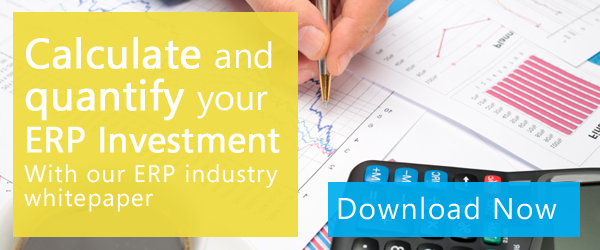When your company invests in ERP software, you can typically expect a 10-15 year span of  using the software before it becomes outdated or misaligned with the needs of your organization. Therefore, to receive a positive ROI on your investment, you need to do your research before spending significant amounts of money, resources, and time on ERP software. Moreover, by investing in upgrades throughout the software’s lifecycle, companies will get even more out of using their ERP systems.
using the software before it becomes outdated or misaligned with the needs of your organization. Therefore, to receive a positive ROI on your investment, you need to do your research before spending significant amounts of money, resources, and time on ERP software. Moreover, by investing in upgrades throughout the software’s lifecycle, companies will get even more out of using their ERP systems.
Here are some critical success factors that companies looking to upgrade their ERP software need to consider:
1. Upgrade Analysis
The frequent upgrades released by ERP vendors can leave users playing catch-up. Any upgrades should be considered both from a value and execution perspective. An upgrade analysis is crucial to determining the need for upgrading. The motivation for upgrading varies from company to company. For the most part, upgrading enables companies to enjoy new functionalities and features in the ERP.
For example, companies that use Microsoft Dynamics AX 2012 may be looking to transition to Microsoft Dynamics AX 2012 R2, or the latest Service Pack. However, any upgrades should be guided by the value that the ERP will bring to the company upon implementation. While ERP vendors provide guidelines on upgrading, your reseller will be in a better position to advise you on how best you can take advantage of the new functionality in an upgraded ERP version.
2. Roll-out Plan
While upgrades may be meant to allow users to be more productive through collaboration, ease of use, KPIs, and other avenues, the exercise can be draining if the targeted users are not involved. The roll-out plan should include communication, training, and other forms of organizational change management. Changes brought about by an ERP upgrade may seem trivial compared to a full change in the system. However, some new functionalities may be significantly different from the older versions of the software, and thus arises the need to educate and train users on the upgrades.
3. Project Management
Upgrades may not be as complex as a full implementation, but a lot of things can go wrong that can lead to significant losses in revenues. Every upgrade requires an effective project manager who will ensure the deployment of the system in a timely fashion and cost effective manner. Lack of implementation project management and executive management support leads to the failure of most upgrades.
Having a dedicated implementation team for the project is crucial. These people may be key operational users who will be critical to the success of the upgrade. The project manager should be able to work with multiple implementation teams, partners, and business process owners.
4. Deployment Risks
In developing the roll-out plan and managing the implementation, it is important to consider a number of deployment issues and risks early in the project, and manage them accordingly. Some of the items that will need to be managed include:
i) Support and help desk processes required at go-live and post-live periods
ii) Data migration to ensure the legacy software is migrated and tested prior to its deployment
iii) User acceptance testing and conference room pilots to ensure the new software upgrades are technically sound and fit the organization’s business requirements
iv) A clear business blueprint and definition of end-to-end business processes and workflows
5. Data Integration
Data integration is a pertinent part of upgrading that should be given adequate attention before the ERP system goes live. Upgrading requires data to be cleansed, migrated, and tested before go-live. The first thing to consider is the integrity of the data. Even if you had recently upgraded your software, there are chances that your data may have been compromised during the lifecycle of your current ERP. A comprehensive strategy that outlines the data migration route is crucial to a successful upgrading exercise. Knowing the business processes and ensuring data integrity remains the same until go-live is crucial.
An upgrade is a critical milestone in a company, both in terms of operational efficiency and the ERP vendor relationship. Working with partners that understand the scope of your ERP upgrade and the needs of your company is critical to the success of any upgrade.
 4 Critical Success Factors for ERP System Upgrades">
4 Critical Success Factors for ERP System Upgrades">
